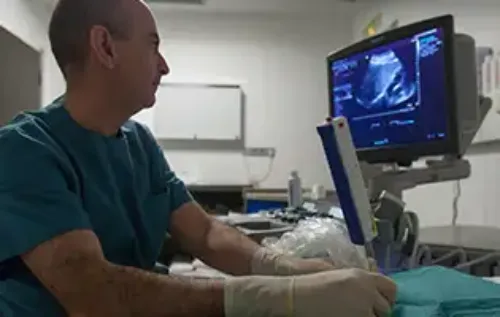Chronic Pancreatitis
"Chronic pancreatitis does not represent an urgent yet important situation. The treatment is aimed at improving the quality of life of the patients".
DR. Mª TERESA BETÉS
SPECIALIST. DIGESTIVE DEPARTMENT

Chronic pancreatitis is a process of long evolution that consists of an alteration of the structure of the gland basically due to fibrosis (inadequate healing), which is progressive over time and ends up destructuring the entire gland, reaching, in the end, to alter all the functions of this organ.
The pancreas is a gland located in the abdomen, just below the diaphragm, in front of the spine and behind the stomach.

What are the symptoms of chronic pancreatitis?
The main symptom of chronic pancreatitis is chronic pain, which is present in over 80% of patients. It is often a continuous pain, of moderate intensity, in the upper abdomen, radiating towards the back, which worsens after meals or after drinking alcohol and which improves when the trunk is bent forward or when lying on the stomach. The pain is usually continuous or in the form of episodes of exacerbation, without in some cases completely disappearing between episodes.
As the pancreatitis evolves and the pancreatic gland deteriorates, the pain tends to disappear, a fact that can occur from 5 to 20 years after the beginning of the picture.
Most common symptoms:
- Abdominal pain.
- Nausea and vomiting.
- Abdominal distension.
Other symptoms that the disease can present are related to the progressive deterioration of the pancreatic function and usually they appear at moments in which the disease is advanced. Among them, diarrhea and weight loss can appear in relation to an inadequate digestion of food and the impossibility of the organism to assimilate it, leading to a progressive malnutrition. Diabetes can also appear due to not producing insulin properly.
Do you have any of these symptoms?
You may have chronic pancreatitis
What are the causes of chronic pancreatitis?
The most common cause of chronic pancreatitis is chronic alcohol abuse. Alcohol can trigger pancreatitis in some patients even at mild or moderate doses depending on genetic predisposition, nutritional habit and other factors.
Other not so clear causes are some predisposing nutritional and genetic factors. Among the dietary causes, very low protein and very low or excessive fat diets stand out.
What is your prognosis?
The prognosis of chronic pancreatitis is uncertain. It is a slow but progressive disease that, however, in our environment rarely constitutes a direct cause of death.
Patients who suffer from it have a life expectancy below that of the general population and usually die from the effects of alcohol, pancreatic cancer or cancer associated with liver cirrhosis and complications of pancreatitis or after possible surgery.
When the cause is alcohol, abandoning it, although it does not make the pancreatitis disappear, notably improves its symptoms and prognosis.
How is chronic pancreatitis diagnosed?

In chronic pancreatitis, the first data to be taken into account in order to suspect it should be a suggestive clinical history (chronic alcohol intake, chronic or episodic abdominal pain, weight loss, diarrhea, diabetes...).
For a diagnosis of certainty there must be at least one of the following two pieces of information:
- Morphological alteration of the pancreas, demonstrated by endoscopic study of the pancreatic duct, scan or echoendoscopy.
- Deterioration of pancreatic function demonstrated by special pancreatic function tests.
How is chronic pancreatitis treated?
Chronic pancreatitis does not represent an urgent but important situation. The treatment is aimed at improving the quality of life of the patients and to try to palliate those complications that may arise.
The first objective of the treatment is to relieve or suppress the pain through measures that go from less to more intensity. In some cases the pain improves or disappears if alcohol is avoided and a light diet with frequent and small meals is followed.
In other cases mild analgesics are needed, or stronger ones or those associated with tranquilizers or opiates. In rebellious cases it may be necessary to block the nerves that carry the pain to the brain by means of radiological or endoscopic techniques and even surgery.
It should also be attempted that the function that the pancreas is losing be replaced by the oral administration of enzymes that it no longer manufactures. If diabetes is triggered, it must be treated appropriately.
The Department of Digestive
of the Clínica Universidad de Navarra
The Digestive Department of the Clinica Universidad de Navarra is composed of a multidisciplinary team of specialists who are experts in the diagnosis and treatment of diseases of the digestive tract.
Our objective is that each diagnosis be carefully established and the treatment plan adjusted to each patient.

Why at the Clinica?
- Medical specialists who are national references.
- Specialized nursing team.
- Endoscopy Unit and High Risk Digestive Tumor Prevention and Consultation Unit to offer the best care to our patients.















